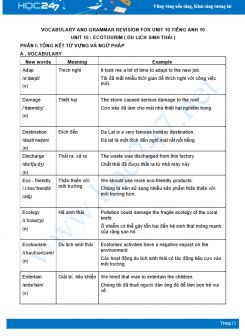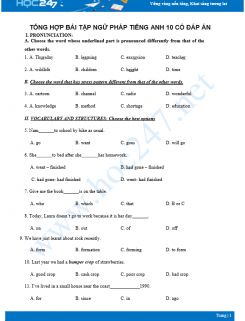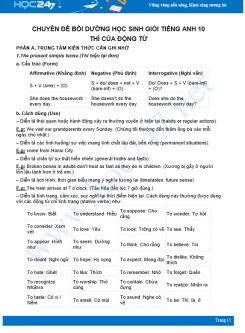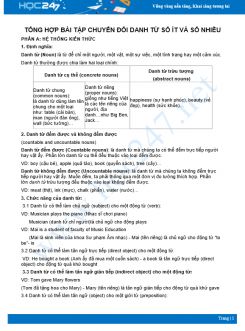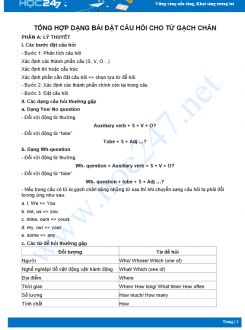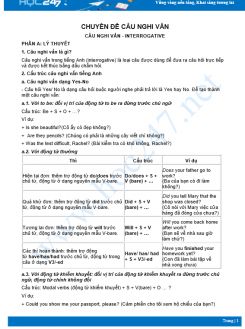Nß╗Öi dung t├Āi liß╗ću Vocabulary and Grammar Revision for Unit 9 Tiß║┐ng Anh 10 ─æŲ░ß╗Żc Hß╗īC247 bi├¬n soß║Īn v├Ā tß╗Ģng hß╗Żp dŲ░ß╗øi ─æ├óy sß║Į hß╗ć thß╗æng tß║źt cß║Ż c├Īc b├Āi tß║Łp trß║»c nghiß╗ćm v├Ā tß╗▒ luß║Łn c├│ ─æ├Īp ├Īn nhß║▒m gi├║p bß║Īn ─æß╗Źc cß╗¦ng cß╗æ kiß║┐n thß╗®c l├Į thuyß║┐t v├Ā r├©n luyß╗ćn kß╗╣ n─āng giß║Żi b├Āi tß║Łp m├┤n Tiß║┐ng Anh 10 Unit 9. Mß╗Øi c├Īc bß║Īn c├╣ng tham khß║Żo.
VOCABULARY AND GRAMMAR REVISION FOR UNIT 9 TIß║ŠNG ANH 10
Unit 9: PRESEVING THE ENVIRONMENT
(Bß║Żo vß╗ć m├┤i trŲ░ß╗Øng)
PHß║”N I: Tß╗öNG Kß║ŠT Tß╗¬ Vß╗░NG V├Ć NGß╗« PH├üP
A. VOCABULARY
|
New words |
Meaning |
Example |
|
Aquatic /'kw├”tik/ (adj) |
DŲ░ß╗øi nŲ░ß╗øc, sß╗æng trong nŲ░ß╗øc |
The overuse of chemicals can kill aquatic animals. Viß╗ćc sß╗Ł dß╗źng h├│a chß║źt qu├Ī mß╗®c c├│ thß╗ā giß║┐t chß║┐t c├Īc ─æß╗Öng vß║Łt dŲ░ß╗øi biß╗ān. |
|
Article /ŌĆÖa:tik/ (n) |
B├Āi b├Īo |
It is very difficult to analyze this article. Rß║źt kh├│ ─æß╗ā ph├ón t├Łch b├Āi b├Īo n├Āy. |
|
Chemical /ŌĆÖkemik ╔Öl/ (n) |
H├│a chß║źt |
Dangerous chemicals were released into the river. Nhß╗»ng h├│a chß║źt nguy hiß╗ām ─æ├Ż ─æŲ░ß╗Żc thß║Żi ra s├┤ng. |
|
Confuse /kŌĆÖ╔Öfju:z/ (v) |
L├Ām bß╗æi rß╗æi, nhß║¦m lß║½n |
The information on the board confused people. Th├┤ng tin tr├¬n bß║Żng l├Ām mß╗Źi ngŲ░ß╗Øi bß╗æi rß╗æi. |
|
Confusion /k╔ÖnŌĆÖfju:╩Æ╔Ön/ (n) |
Sß╗▒ bß╗æi rß╗æi, nhß║¦m lß║½n |
There is a lot of confusion about this issue. C├│ nhiß╗üu sß╗▒ bß╗æi rß╗æi vß╗ü vß║źn ─æß╗ü n├Āy. |
|
Consumption /k ╔ÖnŌĆÖs ╩īmp ╩ā ╔Ön/ (n) |
Sß╗▒ ti├¬u d├╣ng, ti├¬u thß╗ź |
Oil consumption often increases in cold weather. Viß╗ćc ti├¬u thß╗ź dß║¦u thŲ░ß╗Øng t─āng l├¬n v├Āo thß╗Øi tiß║┐t lß║Īnh |
|
Contaminate / k ╔ÖnŌĆÖt ├”mineit/ (v) |
L├Ām bß║®n, ├┤ nhiß╗ģm |
The drinking water is contaminated with lead. NŲ░ß╗øc uß╗æng bß╗ŗ nhiß╗ģm ch├¼. |
|
Damage /ŌĆÖd├”mid ╩Æ/ (v) |
L├Ām hß╗Ång, thiß╗ćt hß║Īi |
Many buildings were damaged in the storm. Nhiß╗üu t├▓a nh├Ā bß╗ŗ hŲ░ hß╗Ång trong cŲĪ b├Żo. |
|
Deforestation /di:f ╔ÆriŌĆÖstei ╩ā ╔Ön/ (n) |
Sß╗▒ ph├Ī rß╗½ng |
Deforestation has a negative effect on the environment. Nß║Īn ph├Ī rß╗½ng c├│ ß║Żnh hŲ░ß╗¤ng ti├¬u cß╗▒c ─æß║┐n m├┤i trŲ░ß╗Øng. |
|
Degraded /digreid/ (adj) |
Giß║Żm s├║t chß║źt lŲ░ß╗Żng |
We have changed and degraded the natß╗¦al environment. Ch├║ng ta ─æ├Ż l├Ām thay ─æß╗Ģi v├Ā l├Ām hß║Īi ─æß║┐n m├┤i trŲ░ß╗Øng tß╗▒ nhi├¬n. |
|
Deplete /diŌĆÖpli:t/ (v) |
Cß║Īn kiß╗ćt |
Food supplies are severely depleted. Nguß╗ōn thß╗®c ─ān bß╗ŗ cß║Īn kiß╗ćt nghi├¬m trß╗Źng. |
|
Depletion / diŌĆÖpli: ╩ā╔Ön/ (n) |
Sß╗▒ cß║Īn kiß╗ćt |
Over - exploitation of oil will lead to the depletion of this natural resource. Viß╗ćc khai th├Īc qu├Ī mß╗®c sß║Į dß║½n ─æß║┐n sß╗▒ cß║Īn kiß╗ćt nguß╗ōn t├Āi nguy├¬n n├Āy. |
|
Destruction /diŌĆÖstr ╩īk ╩ā╔Ön/ |
Sß╗▒ ph├Ī hß╗¦y, sß╗▒ hß╗¦y diß╗ćt |
We should be responsible for the destruction of the forest. Ch├║ng ta n├¬n chß╗ŗu tr├Īch nhiß╗ćm cho viß╗ćc ph├Ī hß╗¦y rß╗½ng. |
|
Ecosystem /ŌĆÖi :k╔Ö ╩Ŗ,sist╔Öm/ (n) |
Hß╗ć sinh th├Īi |
Tourism is damaging our ecosystem. Ng├Ānh du lß╗ŗch ─æang g├óy hß║Īi ─æß║┐n hß╗ć sinh th├Īi cß╗¦a ch├║ng ta. |
|
Editor /ŌĆÖedit╔Ör/ (n) |
Bi├¬n tß║Łp vi├¬n |
She is an editor C├┤ ß║źy l├Ā bi├¬n tß║Łp vi├¬n. |
|
Fertilizer /ŌĆÖf ╔£:tilaiz╔Ör/ (n) |
Phân bón |
The overuse of chemical fertilzen can lead to soil pollution. |
|
Fossil fuel /ŌĆÖf ╔Æs╔ÖlŌĆÖfju:╔Öl/ (n) |
Nhi├¬n liß╗ću h├│a thß║Īch |
Fossil fuels are non - renewable energy sources such as coal or oil formed from dead animals and flants underground. Nhi├¬n liß╗ću h├│a thß║Īch l├Ā c├Īc nguß╗ōn n─āng lŲ░ß╗Żng kh├┤ng thß╗ā t├Īi tß║Īo nhŲ░ than ─æ├Ī, dß║¦u m├Ā ─æŲ░ß╗Żc h├¼nh th├Ānh tß╗½ ─æß╗Öng thß╗▒c vß║Łt chß║┐t dŲ░ß╗øi ─æß║źt. |
|
Global warming /gl╔Ö╩Ŗbl w ╔ö:mi┼ŗ/ (n) |
Sß╗▒ n├│ng l├¬n to├Ān cß║¦u |
Global warming is one of the biggest probl├®m that we are facing. Sß╗▒ n├│ng l├¬n to├Ān cß║¦u l├Ā mß╗Öt trong nhß╗»ng vß║źn ─æß╗ü lß╗øn nhß║źt m├Ā ch├║ng ta ─æang ─æß╗æi mß║Ęt. |
|
Greenhouse effect /ŌĆÖgri:nha╩Ŗs IŌĆÖfekt/ (n) |
Hiß╗ću ß╗®ng nh├Ā k├Łnh |
Greenhouse effect is the gradual increase of temperature on the earthŌĆÖs surface. Hiß╗ću ß╗®ng nh├Ā k├Łnh l├Ā sß╗▒ t─āng nhiß╗ćt ─æß╗Ö tß╗½ tß╗½ l├¬n bß╗ü mß║Ęt tr├Īi ─æß║źt. |
|
Inorganic /in ╔ö:ŌĆÖg├”nik/ (adj) |
V├┤ cŲĪ |
Dumping inorganic waste in the ground cause soil pollution. ─Éß╗Ģ r├Īc v├┤ cŲĪ v├Āo ─æß║źt g├óy ra sß╗▒ ├┤ nhiß╗ģm ─æß║źt. |
|
Long - term /l╔Æ┼ŗŌĆÖt╔£:m/ (adj) |
D├Āi hß║Īn |
They should have a long-term investment in this project. Hß╗Ź n├¬n c├│ sß╗▒ ─æß║¦u tŲ░ d├Āi hß║Īn v├Āo dß╗▒ ├Īn n├Āy. |
|
Pesticide /ŌĆÖpestisaid/ (n) |
Thuốc trừ sâu |
Dumping pollutants such as pesticides and other chemicals in rivers mak├® water contaminated. Thß║Żi c├Īc chß║źt ├┤ nhiß╗ģm nhŲ░ thuß╗æc trß╗½ s├óu v├Ā c├Īc h├│a chß║źt kh├Īc v├Āo d├▓ng s├┤ng l├Ām cho nŲ░ß╗øc bß╗ŗ ├┤ nhiß╗ģm. |
|
Pollutant /p╔ÖŌĆÖlu:t╔Önt/ (n) |
Chß║źt ├┤ nhiß╗ģm |
Factories should stop releasing pollutants. C├Īc nh├Ā m├Īy n├¬n ngß╗½ng viß╗ćc thß║Żi c├Īc chß║źt ├┤ nhiß╗ģm. |
|
Pollute /p╔ÖŌĆÖlu:t/ (v) |
G├óy ├┤ nhiß╗ģm |
We need a fuel that wonŌĆÖt pollute the environment. Ch├║ng ta cß║¦n mß╗Öt loß║Īi nhi├¬n liß╗ću m├Ā kh├┤ng l├Ām ├┤ nhiß╗ģm m├┤i trŲ░ß╗Øng. |
|
Pollution /p╔ÖŌĆÖlu: ╩ā╔Ön/ (n) |
Sß╗▒ ├┤ nhiß╗ģm |
Environmental pollution is becoming a serious problem. ├ö nhiß╗ģm m├┤i trŲ░ß╗Øng ─æang trß╗¤ th├Ānh mß╗Öt vß║źn ─æß╗ü nghi├¬m trß╗Źng. |
|
Preservation /ŌĆÖprez╔ÖŌĆÖvei ╩ā╔Ön/ (n) |
Sß╗▒ bß║Żo tß╗ōn, giß╗» g├¼n |
I think the preservation of old buildings is very necessary. T├┤i ngh─® rß║▒ng viß╗ćc bß║Żo tß╗ōn c├Īc t├▓a nh├Ā cß╗Ģ th├¼ rß║źt cß║¦n thiß║┐t. |
|
Preserve /priŌĆÖz╔£:v/ (v) |
Bß║Żo tß╗ōn, giß╗» g├¼n, bß║Żo vß╗ć |
The government should do more to preserve the enivironment. Ch├Łnh phß╗¦ n├¬n l├Ām nhiß╗üu viß╗ćc hŲĪn nß╗»a ─æß╗ā bß║Żo vß╗ć m├┤i trŲ░ß╗Øng. |
|
Protection /pr ╔ÖŌĆÖtek ╩ā╔Ön/ (n) |
Sß╗▒ bß║Żo vß╗ć |
We need your protection. Ch├║ng t├┤i cß║¦n sß╗▒ bß║Żo vß╗ć cß╗¦a bß║Īn. |
|
Solution / s╔ÖŌĆÖlu: ╩ā╔Ön/ (n) |
Giß║Żi ph├Īp |
There is no solution to this problem. Kh├┤ng c├│ giß║Żi ph├Īp cho vß║źn ─æß╗ü n├Āy. |
|
Vegetation /,ved ╩ÆiŌĆÖtei╩ā╔Ön/ (n) |
C├óy cß╗Å, thß╗▒c vß║Łt. |
Desert areas have little vegetation Nhß╗»ng v├╣ng sa mß║Īc c├│ rß║źt ├Łt thß╗▒c vß║Łt. |
B. GRAMMAR
*REPORTED SPEECH ( Lß╗£I N├ōI TŲ»ß╗£NG THUß║¼T, GI├üN TIß║ŠP)
1. Definition
Lß╗Øi n├│i gi├Īn tiß║┐p l├Ā lß╗Øi n├│i thuß║Łt lß║Īi ├Į cß╗¦a ngŲ░ß╗Øi n├│i, th├┤ng tin ─æi tß╗½ ngŲ░ß╗Øi thß╗® nhß║źt qua ngŲ░ß╗Øi thß╗® hai ─æß║┐n ngŲ░ß╗Øi thß╗® ba. Trong lß╗Øi n├│i gi├Īn tiß║┐p th├¼ cß║źu tr├║c c├óu c├│ sß╗▒ biß║┐n ─æß╗Ģi vß╗ü mß║Ęt ngß╗» ph├Īp.
E.g
Trß╗▒c tiß║┐p: He said,ŌĆØI am a student.ŌĆØ
Gi├Īn tiß║┐p: He said (that) he was a student.
2. Types of sentences in reported speech ( c├Īc loß║Īi c├óu trong lß╗Øi n├│i gi├Īn tiß║┐p)
a. Statements ( C├óu kß╗ā/ C├óu trß║¦n thuß║Łt)
C├óu trß║¦n thuß║Łt l├Ā kiß╗āu c├óu d├╣ng ─æß╗ā kß╗ā, x├Īc nhß║Łn, mi├¬u tß║Ż, th├┤ng b├Īo, nhß║Łn ─æß╗ŗnh, tr├¼nh b├Āy vß╗ü nhß╗»ng hiß╗ćn tŲ░ß╗Żng, nhß╗»ng hoß║Īt ─æß╗Öng, trß║Īng th├Īi, t├Łnh chß║źt trong thß╗▒c tß║┐.
E.g: ŌĆ£Mary said,ŌĆØ I am watching TVŌĆØ
- Khi chuyß╗ān mß╗Öt c├óu trß║¦n thuß║Łt trß╗▒c tiß║┐p sang gi├Īn tiß║┐p th├¼ ch├║ng ta phß║Żi thß╗▒c hiß╗ćn nhŲ░ sau:
+ D├╣ng ─æß╗Öng tß╗½ say hoß║Ęc tell:
|
S + say/ say to sb/ tell sb (that) + S + ŌĆ”ŌĆ” |
Form:
+ ─Éß╗Ģi c├Īc ─æß║Īi tß╗½ nh├ón xŲ░ng, t├Łnh tß╗½ sß╗¤ hß╗»u, ŌĆ”..sao cho tŲ░ŲĪng ß╗®ng vß╗øi mß╗ćnh ─æß╗ü ch├Łnh
E.g:
Trß╗▒c tiß║┐p: Nga said,ŌĆØI am reading books.ŌĆØ
Gi├Īn tiß║┐p: Nga said (that) she was reading books.
Trß╗▒c tiß║┐p: She said, ŌĆ£My brother is a doctorŌĆØ.
Gi├Īn tiß║┐p: She said (that) her brother was a doctor.
+ Thay ─æß╗Ģi ŌĆ£th├¼ŌĆØ cß╗¦a ─æß╗Öng tß╗½
- ŌĆ£th├¼ŌĆØ cß╗¦a ─æß╗Öng tß╗½ trong lß╗Øi n├│i gi├Īn tiß║┐p thay ─æß╗Ģi theo mß╗Öt nguy├¬n tß║»c chung l├Ā l├╣i th├¼:
|
S + said/ said to sb/ told sb (that) + S + V( l├╣i th├¼ )ŌĆ”.. |
Form
Saul ─æ├óy l├Ā bß║Żng chß╗ē sß╗▒ thay ─æß╗Ģi ŌĆ£th├¼ŌĆØ cß╗¦a ─æß╗Öng tß╗½ trong lß╗Øi n├│i Gi├Īn tiß║┐p.
|
Lß╗Øi n├│i trß╗▒c tiß║┐p ( Direct speech) |
Lß╗Øi n├│i gi├Īn tiß║┐p ( Reported speech) |
|
Hiß╗ćn tß║Īi ─æŲĪn He said, ŌĆ£I work in a bank.ŌĆØ |
Qu├Ī khß╗® ─æŲĪn -> He said (that) he worked in a bank |
|
Hiß╗ćn tß║Īi tiß║┐p diß╗ģn Nam said, I am talking to my brother.ŌĆØ |
Qu├Ī khß╗® tiß║┐p diß╗ģn -> Nam said (that) he was talking to his brother. |
|
Hiß╗ćn tß║Īi ho├Ān th├Ānh Mr Ha said, ŌĆ£ I have bought a computer.ŌĆØ |
Qu├Ī khß╗® ho├Ān th├Ānh -> Mr Ha said (that) he had bought a computer. |
|
Hiß╗ćn tß║Īi ho├Ān th├Ānh tiß║┐p diß╗ģn He said, ŌĆ£I have been waiting for you for 2 hours.ŌĆØ |
Qu├Ī khß╗® ho├Ān th├Ānh tiß║┐p diß╗ģn -> Ha said (that) he/ she had been waiting for me for 2 hours. |
|
Qu├Ī khß╗® ─æŲĪn She said, ŌĆ£ I did the exercise.ŌĆØ |
Qu├Ī khß╗® ho├Ān th├Ānh -> She said (that) she had done the exercise. |
|
TŲ░ŲĪng lai ─æŲĪn She said, ŌĆ£I did the exercise.ŌĆØ |
TŲ░ŲĪng lai trong qu├Ī khß╗® -> My mother said (that) she would visit Hue city. |
|
TŲ░ŲĪng lai tiß║┐p diß╗ģn He said, ŌĆ£I will be sitting at the caf├®.ŌĆØ |
TŲ░ŲĪng lai tiß║┐p diß╗ģn trong qu├Ī khß╗® -> He said (that) he would be sitting at the caf├®. |
|
TŲ░ŲĪng lai gß║¦n ( Is/ am/ are going to do) They said, ŌĆ£ We are going to build a new house.ŌĆØ |
Was/ were going to do -> They said (that) they were going to build a new house. |
|
Can/ may/ must do He said, ŌĆ£ I must do my homework.ŌĆØ |
Could/ might/ had to do -> He said (that) he had to do his homework. |
+ Thay ─æß╗Ģi t├Łnh tß╗½ chß╗ē ─æß╗ŗnh, trß║Īng tß╗½ chß╗ē thß╗Øi gian, nŲĪi chß╗æn
|
Lß╗Øi n├│i trß╗▒c tiß║┐p ( Direct speech) |
Lß╗Øi n├│i gi├Īn tiß║┐p ( Reported speech ) |
|
This/ These |
That/ Those |
|
Here |
There |
|
Now |
Then |
|
Today |
That day |
|
Ago |
Before |
|
Tomorrow |
The next day/ the following day/ the day after |
|
The day after tomorrow |
Two days after/ in two dayŌĆÖs time |
|
Yesterday |
The day before/ the previous day |
|
The day before yesterday |
Two days before |
|
Last week |
The previous week/ the week before |
|
Next week |
The next week/ the following week/ the week after |
E.g:
Trß╗▒c tiß║┐p: She said, ŌĆ£ I saw him here in this room yesterday.ŌĆØ
Gi├Īn tiß║┐p: She said (that) she had seen him there in that room the day before/ the previous day.
Ngo├Āi quy tß║»c chung tr├¬n ─æ├óy th├¼ cß║¦n nhß╗ø rß║▒ng t├¼nh huß╗æng thß║Łt v├Ā thß╗Øi gian khi h├Ānh ─æß╗Öng ─æŲ░ß╗Żc thuß║Łt lß║Īi ─æ├│ng vai tr├▓ rß║źt quan trß╗Źng trong khi chuyß╗ān tß╗½ lß╗Øi n├│i trß╗▒c tiß║┐p sang lß╗Øi n├│i gi├Īn tiß║┐p.
*Note:
- ŌĆ£should, ought to, wouldŌĆØ giß╗» nguy├¬n trong lß╗Øi n├│i gi├Īn tiß║┐p.
- ─Éß╗Öng tß╗½ ŌĆ£tellŌĆØ phß║Żi c├│ t├ón ngß╗».
E.g: She told me that he was a student.
- ─Éß╗Öng tß╗½ ŌĆ£sayŌĆØ c├│ thß╗ā c├│ t├ón ngß╗» hoß║Ęc kh├┤ng. Nß║┐u muß╗æn ─æß╗ü cß║Łp ─æß║┐n ngŲ░ß╗Øi nghe, ta d├╣ng ŌĆ£toŌĆØ
E.g: She said to me that she was doing the housework.
b. Questions ( câu hỏi )
C├óu hß╗Åi ─æŲ░ß╗Żc chia l├Ām loß║Īi:
+ Yes/ No questions ( câu hỏi yes/ No ):
- C├óu hß╗Åi yes/ no l├Ā loß║Īi c├óu hß╗Åi ─æŲ░ß╗Żc trß║Ż lß╗Øi bß║▒ng yes/ no.
E.g
Are you a doctor?
Does he live here?
- ─Éß╗ā chuyß╗ān mß╗Öt hß╗Åi yes/ no tß╗½ trß╗▒c tiß║┐p sang gi├Īn tiß║┐p th├¼ ch├║ng ta l├Ām theo cß║źu tr├║c sau:
|
S1 + asked + (O) + IF/ WHETHER + S2 + V (l├╣i th├¼)ŌĆ”. |
- T├ón ngß╗» sau ─æß╗Öng tß╗½ ŌĆ£askŌĆØ c├│ thß╗ā c├│ hoß║Ęc kh├┤ng.
E.g
Trß╗▒c tiß║┐p: Miss Nga said, ŌĆ£Are you a foreigner?ŌĆØ
Gi├Īn tiß║┐p: Miss Nga asked (me) if/ whether I was a foreigner.
Trß╗▒c tiß║┐p: ŌĆ£Does John understand music? He asked.
Gi├Īn tiß║┐p: He asked (me) if/ whether John understood music.
+ WH - questions ( C├óu hß╗Åi c├│ tß╗½ ─æß╗ā hß╗Åi )
- C├óu hß╗Åi c├│ tß╗½ ─æß╗ā hß╗Åi l├Ā loß║Īi c├óu hß╗Åi m├Ā ngŲ░ß╗Øi hß╗Åi muß╗æn biß║┐t th├¬m th├┤ng tin v├Ā cß║¦n ─æŲ░ß╗Żc giß║Żi ─æ├Īp.
E.g
What are you doing now?
Where did you go yesterday?
- ─Éß╗ā chuyß╗ān c├óu hß╗Åi c├│ tß╗½ ─æß╗ā hß╗Åi tß╗½ trß╗▒c tiß║┐p sang gi├Īn tiß║┐p th├¼ ch├║ng ta l├Ām theo cß║źu tr├║c sau:
|
S1 + asked + (O) + WH - (when, where, howŌĆ”.) + S2 + V ( l├╣i th├¼ )ŌĆ”.. |
E.g
Trß╗▒c tiß║┐p: ŌĆ£ What is your name?ŌĆØ He asked.
Gi├Īn tiß║┐p: He asked (me) what my name was.
C. Imperatives (C├óu mß╗ćnh lß╗ćnh ):
C├óu mß╗ćnh lß╗ćnh l├Ā loß║Īi c├óu d├╣ng ─æß╗ā y├¬u cß║¦u/ ─æß╗ü nghß╗ŗ ngŲ░ß╗Øi kh├Īc l├Ām g├¼ ─æ├│.
C├Īch nhß║Łn biß║┐t c├óu mß╗ćnh lß╗ćnh:
C├óu mß╗ćnh lß╗ćnh thŲ░ß╗Øng ─æŲ░ß╗Żc bß║»t ─æß║¦u bß║▒ng:
- Động từ ( V )
E.g
Open the windows, please. Hoß║Ęc please open the windows. ( Tß╗½ ŌĆ£pleaseŌĆØ c├│ thß╗ü ─æŲ░ß╗Żc th├¬m v├Āo ─æß║¦u hoß║Ęc cuß╗æi c├óu ─æß╗ā tß║Īo ra sß╗▒ lß╗ŗch sß╗▒.)
- DonŌĆÖt + V ŌĆ”ŌĆ” ( Mß╗ćnh lß╗ćnh ß╗¤ phß╗¦ ─æß╗ŗnh )
E.g
DonŌĆÖt smoke in the room.
- Can/ Could/ Will/ Would you + S + V ŌĆ”..? ( Chß╗ē y├¬u cß║¦u lß╗ŗch sß╗▒ )
E.g: Can you lend me some books? ( Bß║Īn c├│ thß╗ā cho t├┤i mŲ░ß╗Żn mß╗Öt v├Āi quyß╗ān s├Īch ─æŲ░ß╗Żc kh├┤ng ?)
─Éß╗ā chuyß╗ān c├óu hß╗Åi c├│ tß╗½ ─æß╗ā hß╗Åi tß╗½ trß╗▒c tiß║┐p sang gi├Īn tiß║┐p th├¼ ch├║ng ta l├Ām theo cß║źu tr├║c sau:
|
S + told/ asked/ ordered + O + (not) + to V +ŌĆ”ŌĆ”. |
E.g
Trß╗▒c tiß║┐p: The teacher said to students ŌĆś Close the door, pleaseŌĆØ.
Gi├Īn tiß║┐p: The teacher asked/ told students to close the door.
Note: Trong c├óu mß╗ćnh lß╗ćnh th├¼ bß║»t buß╗Öc phß║Żi c├│ t├ón ngß╗» ( ngŲ░ß╗Øi nghe ) n├¬n ch├║ng ta cß║¦n t├¼m t├ón ngß╗» trong c├óu.
C├Īc c├Īch ─æß╗ā t├¼m t├ón ngß╗»:
- ─Éß╗æi vß╗øi nhß╗»ng c├óu m├Ā ─æß╗ü b├Āi ─æ├Ż cho sß║Ąn th├¼ ta chß╗ē viß╗ćc lß║źy ─æ├│ m├Ā sß╗Ł dß╗źng.
E.g
Trß╗▒c tiß║┐p: Lan said to Hung: ŌĆ£Open your book.ŌĆØ ( Hung l├Ā t├ón ngß╗» )
Gi├Īn tiß║┐p: Lan told/ asked Hung to open his book.
- ─Éß╗æi vß╗øi nhß╗»ng c├óu m├Ā ngŲ░ß╗Øi nghe ─æŲ░ß╗Żc ─æß║Ęt ß╗¤ vß╗ŗ tr├Ł cuß╗æi c├óu ( c├│ dß║źu phß║®y trŲ░ß╗øc ngŲ░ß╗Øi nghe) th├¼ ta lß║źy ─æ├│ sß╗Ł dß╗źng .
E.g
Trß╗▒c tiß║┐p: ŌĆ£ Help me clean the house, NgaŌĆØ. Said Hung ( Nga l├Ā t├ón ngß╗» )
Gi├Īn tiß║┐p: Hung asked. Told nga to help her clean the house.
- ─Éß╗æi vß╗øi nhß╗»ng c├óu m├Ā kh├┤ng c├│ ngŲ░ß╗Øi nghe ─æŲ░ß╗Żc nhß║»c ─æß║┐n ph├Ła ngo├Āi dß║źu ngoß║Ęc v├Ā kh├┤ng t├¼m thß║źy ß╗¤ cuß╗æi c├óu th├¼ ta xem x├®t ph├Ła trŲ░ß╗øc ngŲ░ß╗Øi n├│i c├│ t├Łnh tß╗½ sß╗¤ hß╗»u hay kh├┤ng. Nß║┐u c├│ th├¼ ta lß║źy ─æ├│ l├Ām t├ón ngß╗».
E.g
Trß╗▒c tiß║┐p: Her mother said: ŌĆ£DonŌĆÖt talk loudly in the room.ŌĆØ ( mß║╣ cß╗¦a c├┤ ß║źy => ngŲ░ß╗Øi nghe l├Ā c├┤ ß║źy, t├ón ngß╗» l├Ā her)
Gi├Īn tiß║┐p: Her mother asked/ told her not to talk loudly in the room.
- ─Éß╗æi vß╗øi nhß╗»ng c├óu m├Ā kh├┤ng thß╗ā t├¼m ─æŲ░ß╗Żc t├ón ngß╗» theo 3 c├Īch tr├¬n th├¼ d├╣ng ŌĆ£meŌĆØ ( t├┤i ) l├Ām t├ón ngß╗» ( ngŲ░ß╗Øi nghe )
E.g
Trß╗▒c tiß║┐p: Lan said:ŌĆØGo home work.ŌĆØ
Gi├Īn tiß║┐p: Lan asked/ told me to go home then.
D. Mß╗Öt sß╗æ trŲ░ß╗Øng hß╗Żp kh├┤ng thay ─æß╗Ģi ŌĆ£th├¼ŌĆØ cß╗¦a ─æß╗Öng tß╗½
- ─Éß╗Öng tß╗½ trong mß╗ćnh ─æß╗ü ch├Łnh ß╗¤ th├¼ hiß╗ćn tß║Īi ─æŲĪn ( say/ says ), hiß╗ćn tß║Īi tiß║┐p diß╗ģn ( is/ are saying ); hiß╗ćn tß║Īi ho├Ān th├Ānh ŌĆ£ ( have said/ has said ); tŲ░ŲĪng lai ─æŲĪn ( will say )
Trß╗▒c tiß║┐p: Tom says, ŌĆ£ I am fine ŌĆ£.
Gi├Īn tiß║┐p: Tom says he is fine. ( Tom n├│i anh ß║źy khß╗Åe )
- Lß╗Øi n├│i trß╗▒c tiß║┐p diß╗ģn tß║Ż mß╗Öt ch├ón l├Į, sß╗▒ thß║Łt hiß╗ān nhi├¬n.
Trß╗▒c tiß║┐p: He said, ŌĆ£ The sun rises in the East.ŌĆØ
Gi├Īn tiß║┐p: He said ( that ) the sun sises in the East.
- Lß╗Øi n├│i trß╗▒c tiß║┐p l├Ā c├Īc c├óu ─æiß╗üu kiß╗ćn loß║Īi II v├Ā III
Trß╗▒c tiß║┐p: ŌĆ£ If I were you, I would meet herŌĆØ he said.
Gi├Īn tiß║┐p: He said that if he were me, he would meet her.
- Lß╗Øi n├│i trß╗▒c tiß║┐p l├Ā cß║źu tr├║c ŌĆ£ Wish + past simple/ past perfectŌĆØ
Trß╗▒c tiß║┐p: ŌĆ£ I wish I lived in Ho Chi Minh CityŌĆØ, she said.
Gi├Īn tiß║┐p: She said she wished he lived in Ho Chi Minh City.
- Cß║źu tr├║c ŌĆ£ ItŌĆÖs time the children went to schoolŌĆØ, she said.
Gi├Īn tiß║┐p: She said it was time the children went to school.
- Lß╗Øi n├│i trß╗▒c tiß║┐p c├│ c├Īc ─æß╗Öng tß╗½ khiß║┐m khuyß║┐t ( could/ would/ should/ might/ ought to/ had better/ used toŌĆ”.)
Trß╗▒c tiß║┐p: Miss Lan said, ŌĆ£ you should study hard.ŌĆØ
Gi├Īn tiß║┐p: Miss Lan said I should study hard.
PHß║”N B: B├ĆI Tß║¼P Vß║¼N Dß╗żNG CŲĀ Bß║óN
B├Āi 1: Choose the best answer to complete the sentence.
1. The stranger asked me where I ____________ from.
A. come B. coming C. to come D. came
2. Ms. Nga wanted to know what time ________.
A. the movie began B. the movie begins
C. does the movie begin D. did the movie begin
3. Mary said she ŌĆ”ŌĆ”ŌĆ” there the day before.
A. is B. had been C. will be D. would be
4. Mai asked Quang ŌĆ”ŌĆ”
A. when he will come back B. when he would come back
C. when he comes back D. when he is coming back
5. She told me _____________ her up at six oŌĆÖclock.
A. please pick B. to pick C. should pick D. I can pick
6. He said that He and his friend _____________ married ______________.
A. were getting/ tomorrow B. are getting/ the next day
C. were getting/ the next day D. will get/ the day after
7. He asked me when _____________ there.
A. did I arrive B. will I arrive C. I had arrived D. I can arrive
8. The teacher said, ŌĆ£ I didnŌĆÖt see her.ŌĆØ -> The teacher said ________ her.
A. he had seen B. I hadnŌĆÖt seen C. he didnŌĆÖt see D. he hadnŌĆÖt seen
9. I wondered _________ the right thing.
A. If I am doing B. was I doing
C. am I doing D. whether I was doing
10. Tom ___________ that his mother was in hospital.
A. told me B. told to me C. said me D. asked me
B├Āi 2: Change the statements into reported speech.
1. ŌĆ£She works in a bankŌĆØ
He said ____ ___.
2. ŌĆ£ We went out last nightŌĆØ
She told me _____they had gone out the previous night ___
3. ŌĆ£IŌĆÖm coming!ŌĆØ
He said _______ ___
4. ŌĆ£ IŌĆÖd never been there beforeŌĆØ
She said _______ _____
5. ŌĆ£ I didnŌĆÖt go to the party ŌĆ£
He told me ____ _______
6. ŌĆ£My mother will come laterŌĆØ
She said _____ ____
7. ŌĆ£ He hasnŌĆÖt eaten breakfastŌĆØ
She told me _____ ______
8. ŌĆ£ You should go to bed early ŌĆ£
She told me ___ _____.
B├Āi 3: Change the questions into reported speech.
1. ŌĆ£ What are you going to do at the weekend?ŌĆÖ
He asked me ____ __.
2. ŌĆ£Where will you work after graduation?ŌĆØ
He asked me ____ ______.
3. ŌĆ£How was the journey?ŌĆØ
He asked me _____ ____.
4. ŌĆ£Do you live in Hanoi?ŌĆØ
She asked me ______ _____.
5. ŌĆ£Did he arrive on time?ŌĆØ
She asked me ____ _______.
B├Āi 4: Change the requests into reported speech.
1. ŌĆ£Please help me carry this suitcaseŌĆØ
She asked me ___ ___.
2. ŌĆ£Please come earlyŌĆØ
She asked me ___ ______.
3. ŌĆ£Could you please open the window?ŌĆØ
She asked me ____ ____.
4. ŌĆ£Do your homework!ŌĆØ
She told me ___ _____.
5. ŌĆ£DonŌĆÖt be late!ŌĆØ
She told me _____ _______.
B├Āi 5: Change the sentences into reported speech
1. Lan said ŌĆ£Can you sing a song?ŌĆØ
2. Miss Hoa asked Hung, ŌĆ£Where did you go last weeks?ŌĆØ
3. Mr Nam said, ŌĆ£ I am taking the IELTS test tomorrow.ŌĆØ
4. My mother said, ŌĆ£ I didnŌĆÖt have a computer last year.ŌĆØ
5. The teacher said, ŌĆ£ You must do your homework yourself.ŌĆØ
6. Mary said, ŌĆ£ I want to be a writer when I grow up.ŌĆØ
7. My mother said, ŌĆ£you should go to bed early.ŌĆØ
8. Lan asked, ŌĆ£ Do many tourists visit Ha Long Bay every year, Mai?.ŌĆØ
9. Mrs Linh said ŌĆ£ She will spend my holiday in Da Lat next monthŌĆØ.
10. Tom told us, ŌĆ£ I do not understand what you are saying.ŌĆØ
PHß║”N C: B├ĆI Tß║¼P Tß╗öNG Hß╗óP N├éNG CAO
B├Āi 6: Choose the best answer to complete the sentence.
1. Jylia said that she ____________there at noon.
A. is going to be B. was going to be C. will be D. can be
2. He _____________that he was leaving way that afternoon.
A. told me B. told to me C. said me D. says to me
3. She said to me that she ______________to me the Sunday before.
A. wrote B. has written C. was writing D. had written
4. I _____________him to sell that old motorbike.
A. said to B. suggested C. advised D. recommended
5. My parents reminded me ______________ the flowers.
A. to planting B. plant C. to plant D. planting
6. I asked Martha __________ to enter law school.
A. are you planning B. is she planning
C. was she planning D. if she was planning
7. Nam wanted to know what time ________________.
A. does the movie begin B. did the movie begin
C. the movie begins D. the movie began
8. I wondered __________________the right thing.
A. whether I was doing B. if I am doing
C. was I doing D. am I doing
9. The scientist said the earth ____________the sun.
A. goes round B. is going around
C. went around D. was going around
10. Peter said that if he ______________rich, he _______________ a lot.
A. is - will travel B. were - would travel
C. had been - would have travelled D. was - will travel
B├Āi 7: Choose the letter A, B, C or D to indicate the underlined part that needs correction.
1. I (A) asked him how far (B) was it from my school to post office (C) if I went there (D) by taxi.
2. They asked me (A) that I (B) could do (C) some shopping (D) with them.
3. Her mother (A) ordered her (B) do not go out with (C) him the day (D) before.
4. She said (A) that the book (B) in the library (C) would be available (D) tomorrow.
5. He (A) advised her (B) thinking about that example (C) again because it needed (D) correcting.
B├Āi 8: Complete the sentence into reported speech.
1. ŌĆ£Open the door,ŌĆØhe said to them.
-> He told them ____ _____.
2. ŌĆ£Where are you going?ŌĆØ he asked her.
-> He asked her where ______ ____.
3. ŌĆ£Which way did they go?ŌĆØ he asked.
-> He asked me ____ _____.
4. ŌĆ£Bring it back if it doesnŌĆÖt fitŌĆØ, I said to her.
-> I told ____ ______.
5. ŌĆ£DonŌĆÖt try to open it now,ŌĆØ she said to us.
-> She told ____ _____.
6. ŌĆ£Is it going to be fine day today?ŌĆØ I asked her.
-> I asked her ____ ______.
7. ŌĆ£HeŌĆÖs not at homeŌĆØ, she says.
-> She says that ____ ___.
8. ŌĆ£Is the bus station far away?ŌĆØ the girl asked.
-> The girl wanted to know ___ ____.
9. ŌĆ£DonŌĆÖt stay out late, AnnŌĆØ Tom said.
-> Tom told Ann ____ ______.
10. ŌĆ£Please let me borrow your car,ŌĆØ he said to her.
-> He asked ___ _______.
B├Āi 9: Complete each of the following sentences in such a way that it means the same as the sentence given.
1. ŌĆ£Would you like to go to the movies with us tonight?ŌĆØ they said to me.
-> They invited _____ _______.
2. To do this test was difficult.
-> It was ___ _______.
3. The last time Bill met Tom was in 2010.
-> Bill hasnŌĆÖt _______ ___.
4. Ms, Smith is proud of her sonŌĆÖs contribution to the play.
-> Ms. Smith is proud of what ____ ____.
5. I had to cancel the birthday party because my grandmother is seriously ill.
-> I had to cancel ___ ___.
B├Āi 10. Complete each of the following sentences in such a way that it means the same as the sentence given using the words in the brackets.
1. ŌĆ£I havenŌĆÖt been home this evening, MaryŌĆØ said Bill (told)
-> Bill ___ _______.
2. I havenŌĆÖt seen my sister for 5 years (since)
-> ItŌĆÖs _____ ____.
3. My book was published last year. It became a best seller. (that)
4. ŌĆ£ IŌĆÖll pick you up at 7:00, KateŌĆØ said Mark (promised)
5. The bad was found later. The robbers put the money in it (in)
ANSWER KEY
B├Āi 1: Choose the best answer to complete the sentence.
1. The stranger asked me where I ____________ from.
A. come B. coming C. to come D. came
2. Ms. Nga wanted to know what time ________.
A. the movie began B. the movie begins
C. does the movie begin D. did the movie begin
3. Mary said she ŌĆ”ŌĆ”ŌĆ” there the day before.
A. is B. had been C. will be D. would be
4. Mai asked Quang ŌĆ”ŌĆ”
A. when he will come back B. when he would come back
C. when he comes back D. when he is coming back
5. She told me _____________ her up at six oŌĆÖclock.
A. please pick B. to pick C. should pick D. I can pick
6. He said that He and his friend _____________ married ______________.
A. were getting/ tomorrow B. are getting/ the next day
C. were getting/ the next day D. will get/ the day after
7. He asked me when _____________ there.
A. did I arrive B. will I arrive C. I had arrived D. I can arrive
8. The teacher said, ŌĆ£ I didnŌĆÖt see her.ŌĆØ -> The teacher said ________ her.
A. he had seen B. I hadnŌĆÖt seen C. he didnŌĆÖt see D. he hadnŌĆÖt seen
9. I wondered _________ the right thing.
A. If I am doing B. was I doing
C. am I doing D. whether I was doing
10. Tom ___________ that his mother was in hospital.
A. told me B. told to me C. said me D. asked me
B├Āi 2: Change the statements into reported speech.
1. ŌĆ£She works in a bankŌĆØ
He said ____ She worked in a bank ___.
2. ŌĆ£ We went out last nightŌĆØ
She told me _____they had gone out the previous night ___
3. ŌĆ£IŌĆÖm coming!ŌĆØ
He said _______he was coming ___
4. ŌĆ£ IŌĆÖd never been there beforeŌĆØ
She said _______she had never been there before _____
5. ŌĆ£ I didnŌĆÖt go to the party ŌĆ£
He told me ____he hadnŌĆÖt gone to the party _______
6. ŌĆ£My mother will come laterŌĆØ
She said _____her mother would come later ____
7. ŌĆ£ He hasnŌĆÖt eaten breakfastŌĆØ
She told me _____he hadnŌĆÖt eaten breakfast ______
8. ŌĆ£ You should go to bed early ŌĆ£
She told me ___i should go to bed early _____.
B├Āi 3: Change the questions into reported speech.
1. ŌĆ£ What are you going to do at the weekend?ŌĆÖ
He asked me ____ what I was you going to do at the weekend __.
2. ŌĆ£Where will you work after graduation?ŌĆØ
He asked me ____ where I would work after graduation ______.
3. ŌĆ£How was the journey?ŌĆØ
He asked me _____ How the journey had been ____.
4. ŌĆ£Do you live in Hanoi?ŌĆØ
She asked me ______ if I lived in HN _____.
5. ŌĆ£Did he arrive on time?ŌĆØ
She asked me ____if I had arrived on time _______.
B├Āi 4: Change the requests into reported speech.
1. ŌĆ£Please help me carry this suitcaseŌĆØ
She asked me ___to help her carry this suitcase ___.
2. ŌĆ£Please come earlyŌĆØ
She asked me ___to come early ______.
3. ŌĆ£Could you please open the window?ŌĆØ
She asked me ____if I could open the window ____.
4. ŌĆ£Do your homework!ŌĆØ
She told me ___ to do my homework _____.
5. ŌĆ£DonŌĆÖt be late!ŌĆØ
She told me _____not to be late _______.
B├Āi 5: Change the sentences into reported speech
1. Lan said ŌĆ£ Can you sing a song?ŌĆØ
Tr├¬n ─æ├óy l├Ā mß╗Öt phß║¦n tr├Łch ─æoß║Īn nß╗Öi dung Vocabulary and Grammar Revision for Unit 9 Tiß║┐ng Anh 10. ─Éß╗ā xem th├¬m nhiß╗üu t├Āi liß╗ću tham khß║Żo hß╗»u ├Łch kh├Īc c├Īc em chß╗Źn chß╗®c n─āng xem online hoß║Ęc ─æ─āng nhß║Łp v├Āo trang hoc247.net ─æß╗ā tß║Żi t├Āi liß╗ću vß╗ü m├Īy t├Łnh.
Hy vß╗Źng t├Āi liß╗ću n├Āy sß║Į gi├║p c├Īc em hß╗Źc sinh ├┤n tß║Łp tß╗æt v├Ā ─æß║Īt th├Ānh t├Łch cao trong hß╗Źc tß║Łp.
Mß╗Øi c├Īc em tham khß║Żo c├Īc t├Āi liß╗ću c├│ li├¬n quan:
- Vocabulary and Grammar Revision for Unit 10 Tiếng Anh 10
- Tß╗Ģng hß╗Żp b├Āi tß║Łp ngß╗» ph├Īp Tiß║┐ng Anh 10 c├│ ─æ├Īp ├Īn
- Chuy├¬n ─æß╗ü bß╗ōi dŲ░ß╗Īng HSG Tiß║┐ng Anh 10 Th├¼ cß╗¦a ─æß╗Öng tß╗½
Ch├║c c├Īc em hß╗Źc tß║Łp tß╗æt!
T├Āi liß╗ću li├¬n quan
TŲ░ liß╗ću nß╗Ģi bß║Łt tuß║¦n
- Xem thêm



